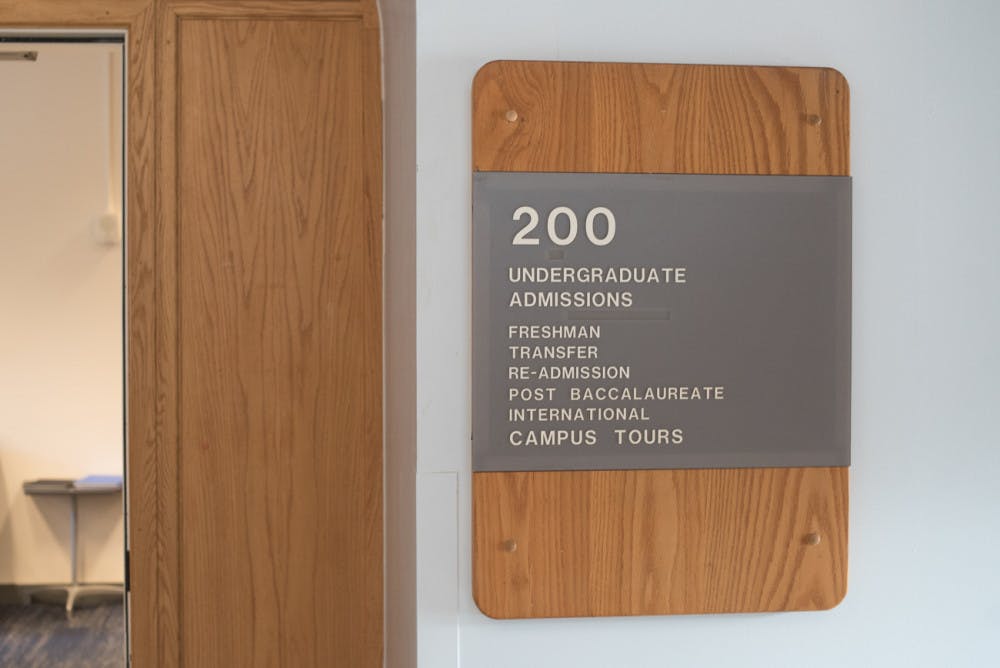By Stella Harvey, Ray Garcia and Zoe Buchli
This story is the first section of a four-part investigative project from an advanced reporting course taught by Betsy O’Donovan. We contacted DeShaun Dowdy multiple times to set up an interview to provide him a chance to respond to the allegations being made in this series. Dowdy declined to comment.
Content Warning: sexual assault and domestic violence.
Imagine you’re the director of admissions at a state university. Each year, you and your admission officers sift through thousands of academic records and personal essays, looking for the best candidates. Your office is tasked with vetting who will get in, and who won’t.
In the 2014-15 academic school year, your 15,060 students include an aspiring industrial designer, an environmental law student and a convicted felon, DeShaun Troy Dowdy.
Here is how this choice was made.
Included in Western’s admissions 2014-15 application is a section where applicants are asked to disclose their criminal record. Specifically, if they have been convicted of a violent offense, required to register as a sex offender, or if they have any pending felony charges.
Cezar Mesquita, Western’s director of admissions since November 2016, said that if an applicant answers yes to any of these questions, they were also asked to provide an explanation detailing their charges, conviction and probationary status.
Western’s admissions office flags those files and works with the chief of University Police, the dean of students and the assistant dean of students to assess the potential impacts of admitting a student with a criminal record, Mesquita said.
“There were a few cases where students did meet that level of risk assessment that made us feel very uncomfortable to have the individual have access to our overall campus community, and in instances of them living in a residence hall,” he said. “It's not done very lightly, as you can imagine.”
Darin Rasmussen, chief of University Police, said several things must be considered when determining an applicant’s risk to campus. When examining an applicant’s criminal history, Rasmussen said he also considers what type of crime was committed, the context of the charges and how much time has passed.
If there are concerns about the person’s potential behavior, Rasmussen said he would consider the resources needed to protect the campus population if the student was admitted.

Read the other stories in this series Behind the systems: Facebook post accuses former Western student of sexual misconduct Behind the systems: Facebook post incites administrative action Behind the systems: Student questions the way Western handles sexual assault allegations
DeShaun Troy Dowdy Editor’s Note: In this section, one of the sources names has been changed. We have granted them anonymity because of the stigma attached to domestic violence. In order to understand DeShaun Troy Dowdy, we have to go to the Tri-Cities in 2002, where, at the age of 13, Dowdy was convicted of child molestion in the first degree. According to court documents from the case, Dowdy sexually assaulted a younger female relative who was under the age of 6. Dowdy was charged in July 2002, and pleaded guilty a month and a half later. Under Washington state law, child molestation in the first degree is a class A felony, defined as “when the person has, or knowingly causes another person under the age of 18 to have, sexual contact with another who is less than 12 years old.” After his conviction, Dowdy was required to register as a sex offender. In 2006, four years after his conviction and two years after completing his court-appointed sexual offender treatment program, Dowdy was convicted of assault in the fourth degree with his then-girlfriend, Jane*, according to court documents. According to the probable cause affidavit, Dowdy visited Jane, despite a no-contact order. The affidavit says Dowdy started an argument with Jane that turned physical, and the two began wrestling on the floor. At Jane’s mother’s urging, the two stopped, but Dowdy started another argument and then followed Jane into her room when she tried to leave, according to the affidavit. “[Dowdy] followed her and physically restrained her by grabbing her around the neck in order to keep her from leaving before law enforcement arrived, which she resisted,” the affidavit says. The two fought until police arrived, and Jane was left with scratches, bite marks and clumps of hair missing, according to the documents. Police separated the two, and Dowdy was issued another no-contact order. When Dowdy moved to Portland in summer 2011 at the age of 22, he started his petition for relief from the duty to register as a juvenile sex offender. According to the Revised Code of Washington, Dowdy was able to ask to be dropped off the registry in January 2012 because he had spent 10 consecutive years in the community without being convicted of a disqualifying offense. Such offenses include sex crimes, kidnapping convictions or failure to register as a sex offender. Under these guidelines, Dowdy’s 2006 assault conviction did not count as a disqualifying offense. Dowdy had to prove to the judge he was “sufficiently rehabilitated” following his completion of the Special Sexual Offender Disposition Alternative program in August of 2004, according to court documents. To make his case, Dowdy gathered personal statements from six people, including roommates and employers from Portland. The letters spoke of Dowdy’s personal growth and character. These documents are included in the original 2002 case file. He also submitted a personal statement. In his statement, Dowdy wrote that “[he has] grown and learned to be a sexually responsible and moral person, and [does] not believe that the requirements of [his] juvenile self are necessary for the adult [he is].” He also included that at the time, when he was 23, he had no adult criminal history and no additional sexual offenses. His statement also mentioned that his move to Oregon was meant to help change his life and to allow him to become part of the poetry community in the Portland area. Darryl Banks was Dowdy’s Sex Offender Treatment Provider for his group and individual therapy during the SSODA program. In a statement from December 2011, Banks wrote, “As I recall, Deshaun participated appropriately in treatment and did not demonstrate any high-risk sexual issues.” His legal records between 2002 and 2012 combined with the personal statements from friends and sexual assault treatment providers allowed his relief from the registry in 2012. He applied and was accepted to Western in Fall 2014. The Family Educational Rights and Privacy Act protects specific student records, such as admissions records, from being obtained through public records requests. Dowdy did not grant our reporting team access to his admissions records. We are unable to confirm whether or not Dowdy disclosed his previous convictions on his application. Ban the box On March 15, 2018, Governor Jay Inslee passed a new law, also known as the Washington Fair Chance to Education Act, in result of a national movement called “Ban the Box.” Per the movement’s official website, the campaign started with supporting convicted felons who face discrimination from employers because of their past. It has since expanded, focusing on advocating for anti-discrimination policies within higher education and housing. Mesquita said the Ban-the-Box law led to several changes in Western’s admissions policies. Now, Western cannot ask applicants to disclose information about their criminal history. “We felt like we had a process that was well-established and well in-place for many years,” Mesquita said. “More readily, an outcome of the Ban-the-Box movement is to give those with a criminal record another chance to pursue opportunities that can help them break cycles of violence, trauma, neglect, or poverty in their own personal lives or within their communities." Western was one of the only two schools in the state still asking about an applicant’s criminal history in the admissions application, Mesquita said. Michael Sledge, Western’s assistant dean of students, said that since some of the larger schools in the state had already adopted a new practice, there wasn’t any resistance to the new legislation. Currently, only students who plan to live on campus can be asked by housing and the dean of students’ office about their criminal background. “The question that admissions used is the exact question that the housing application is using,” Sledge said. “The legislation doesn't prevent us from asking that question or potentially denying housing to people because of their answer to that question.” The university’s admissions office will now only learn about someone’s criminal record if it is self-disclosed. The admissions office also looks for any indications that a student has been involved in lawless or violent activities. “But as you can imagine, for somebody to self-disclose that is particularly difficult and highly unlikely,” Mesquita said. According to Western’s Registrar’s office, Dowdy was admitted in fall 2014. The Ban-the-Box law didn’t go in effect until June 7, 2018. If an admitted student misbehaves, it becomes a question for other campus systems. The next three sections of this series will be published in the following days.






